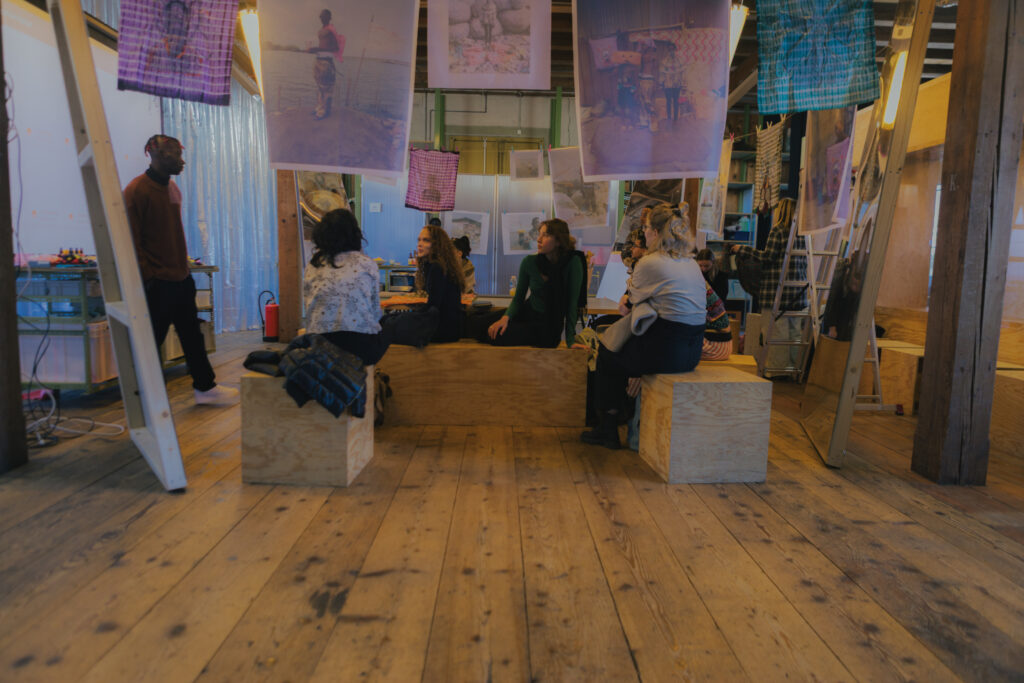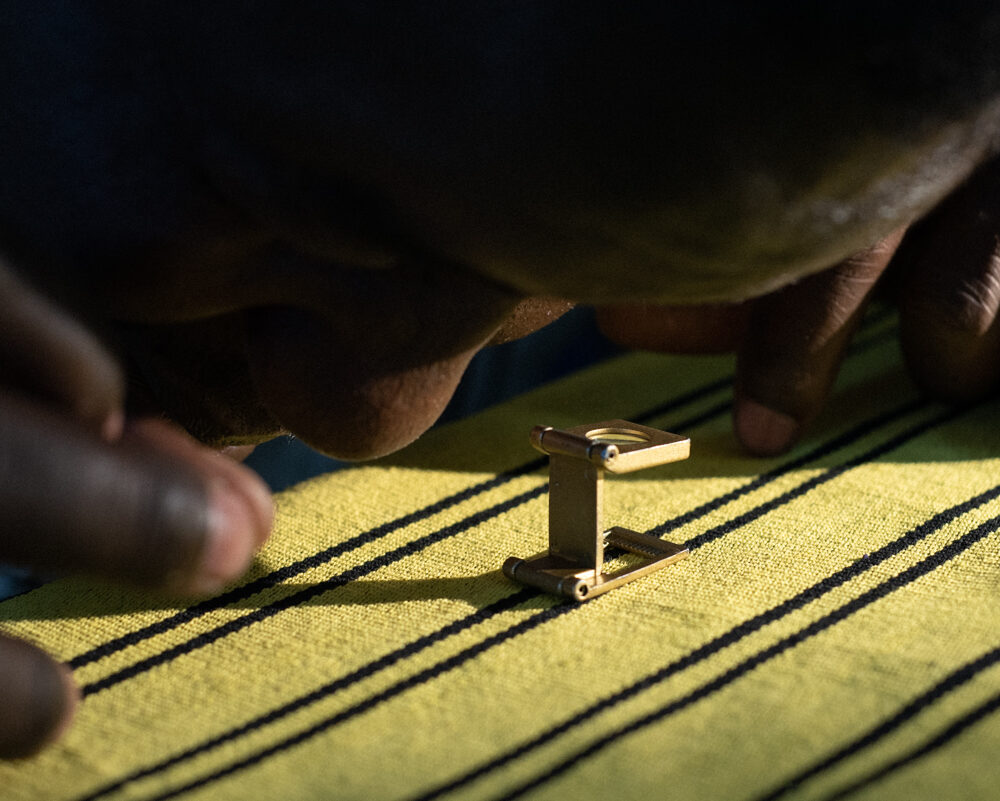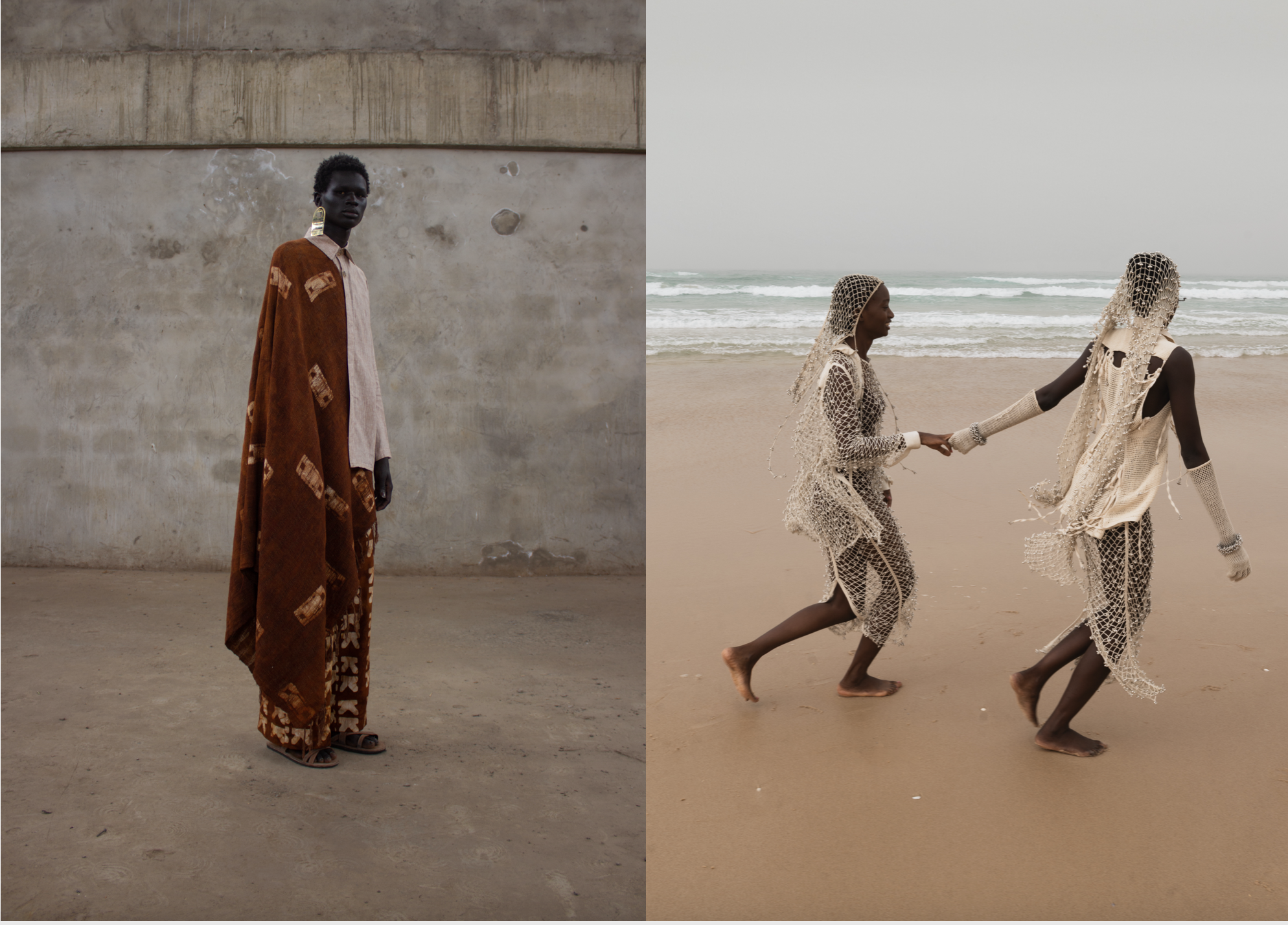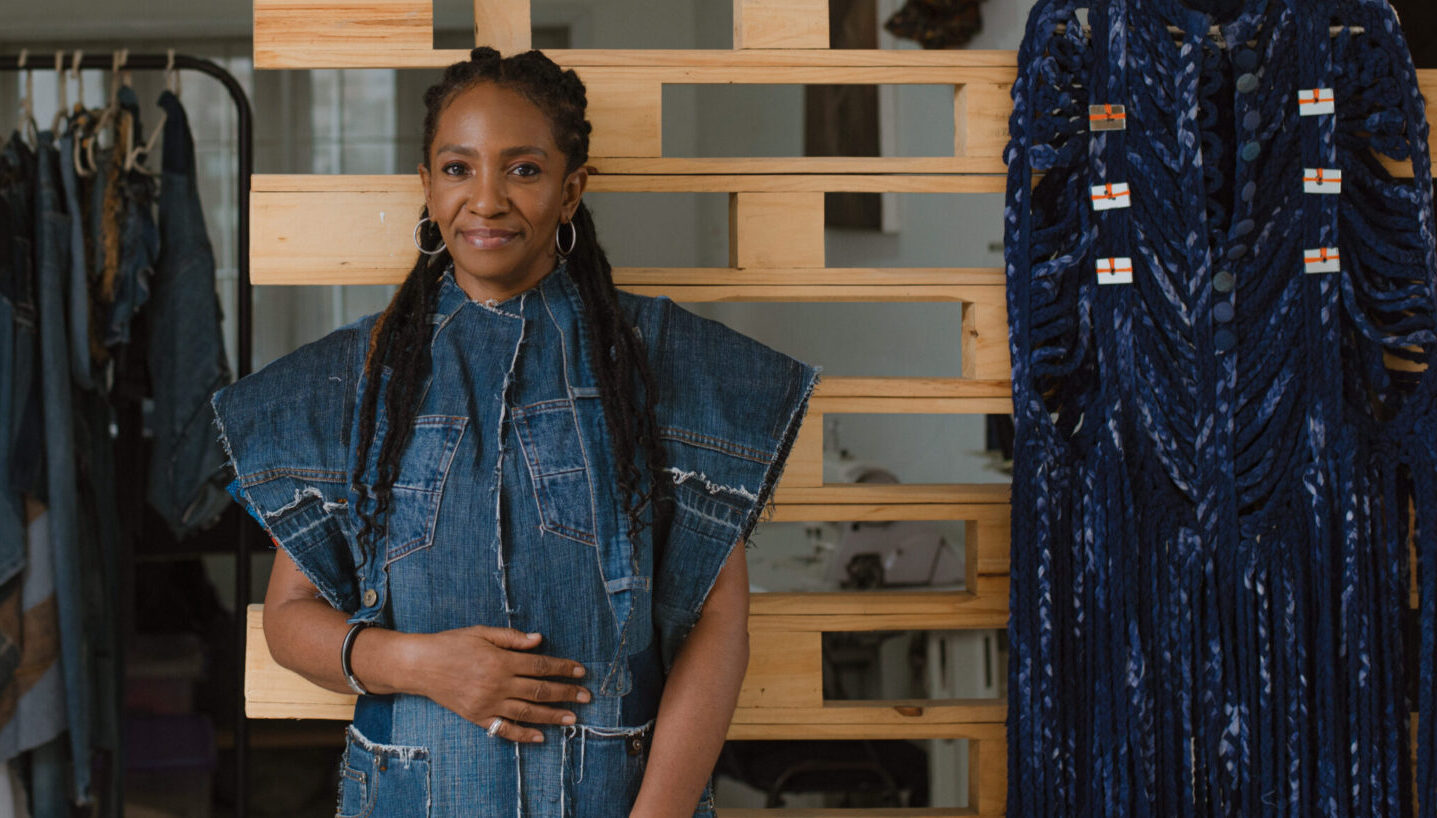This upcycling couturier’s transcontinental fashion practice is an embrace of togetherness
WORDS Helen Jennings
“I want to go beyond the idea of making something individually. I want to create collectively and can see so much potential in working with marginalised artists,” says Rafael Kouto. This multidisciplinary creator is breaking the luxury fashion mould with his workshop-based approach to “community couture”. Whether collaborating with students in Zürich or exploring upcycling on the outskirts of Lagos, Kouto’s award-winning practice is rooted in sustainability, craft and a decolonised state of mind.

Born in Switzerland with mixed Ghanaian and Togolese heritage, he studied fashion at FHNW-HGK in Basel and the Sandberg Institut in Amsterdam before working at Alexander McQueen in London and Maison Martin Margiela and Carven in Paris. All good on paper and yet he found his experiences lacking. “I started to wonder if there was an alternative to the fashion system and so went to the Ethical Fashion Initiative in Geneva and began developing my own research projects inspired by contemporary African artists such as Ibrahim Mahama,” he explains. “I was discovering the global waste management around textiles, and how second-hand clothing ends up in the Global South. And so, I wanted to find a solution for these materials in Switzerland by collaborating with local artisans.”
This led to establishing his avant-garde “community couture” label in 2017. More than just another upcycling brand, his radical approach started with made-to-order designs from pre-and post-consumer clothing and deadstock fabrics, and has since spiralled out to creative direction, education and art-making across a myriad of participatory projects. “I’m interested in engaging people in the process of upcycling and being as transparent as possible, which is why I’ve always run workshops where people can gain knowledge from the brand without needing to buy the garments.”
This deeply inclusive and hybrid approach, drawing on ancestral craftsmanship from West Africa and Europe and the act of communal making, has seen Kouto undertake residencies at TaDA in Arbon, Istituto Svizzero in Milan, Lottozero in Prato and VU.CH in Lausanne as well as exhibit globally and become an associate professor in Fashion Design at the IUAV in Venice, where he teaches undergraduates to think beyond the conventions of seasonal collections.
“I’m thinking about the agency of the materials we throw away and how they remain connected to us.”
One of his own early collections, ‘All The Nothing That Will Remain’ in 2018, sprung out of his now on-going relationship with Texaid, a leading organisation collecting and processing used textiles in Switzerland. By deconstructing and reconstructing discarded garments with a focus on prints, embroidery and weaving, his conceptual pieces defied expectations of what upscaled fashion could look like. And more recently, his 2023 open-source collection ‘A Drop of Sunshine’, an “an alchemical combination of sun and water” in collaboration with Bernina Schweiz sewing machines, offered all patterns as free downloads. Using recycled wools from Italy, handwoven cottons from Burkina Faso and luxury deadstock from France, these exquisitely tailored pieces were accompanied by “do-it-together” accessories crafted from leftovers.
Kouto’s current methodologies stem from a three-month research trip across Ghana and Nigeria at the top of 2025 as part of his Pro Helvetia Johannesburg residency. His time at G.A.S. Foundation in Lagos resulted in the beautiful ‘Circular Heroes’ project. In the Isale Akoka area of Bariga, known for its floating homes made from materials washed up in the lagoon, Kouto collaborated with the Eran Jije Project by local dignitary Peter D. Abayomi to celebrate the already powerful upcycling skills of local youth. And in Lagos he worked with artisans to create a series of screen-printed and hand-dyed scarves that evolved into symbolic flags. The output was shot by Nigerian photographic artist Ruby Okoro, capturing the participants as the conquering champions that they are.

“These young people are innovating every day – turning waste into building materials, electronic repairs, even musical instruments. The project aimed to recognise the importance to what they do by opening up a more artistic aspect to it, and fostering pride and visibility for their contributions to the community,” he explains.
‘Circular Heroes’ has since been exhibited in Milan during Photo Vogue Festival 2025 and been workshopped again at Maison Shift in Zürich.
Currently based in Amsterdam, where he’s a Fellow in Fashion and Textile Research at Jan van Eyck Academie, Kouto is continuing to dig into his journeys through Lagos, Ibadan, Accra, Kumasi and Tamale. At first investigating the coloniality of fashion, he found himself naturally drawn into spiritual realms. “Doing ‘Circular Heroes’ got me thinking about the agency of the materials we throw away and how they remain connected to us as their lifecycle continues. In Baraga, they turn waste into new territory, into new land floating on water. Waste is something they need and which closes the loop. So how can we use ritual – a collective process – to de-activate and reactivate them in order to give them a new life?”
This has led the artist to look at ideas around alters and talismans made from packaging waste. These “magic containers” become portable symbols of the beliefs and knowledge systems that connect the Black transatlantic diaspora; manifestations that, he says, effortlessly “code-switch between Western and vernacular discourses”. Whether the eventual outcome of these experiments transforms into an installation, workshop or wearable collection, we can be sure that Kouto’s revolutionary practice will continue to inspire. “I still love fashion, but I see more potential for textiles in terms of the messages they can carry,” he muses. “It gives me hope to think about working with more creatives and together celebrating the unique blend between craft, spirituality, textiles and upcycling.
Photography Ruby Okoro (Circular Heroes), Bernina Schweiz and Alexander Palacios (A Drop of Sunshine), Jean-Vincent Simonet (All The Nothing Will Remain)
„Ich möchte über das Individuelle hinausgehen. Gemeinsam etwas schaffen. Besonders mit marginalisierten Künstler:innen sehe ich enormes Potenzial“, sagt Rafael Kouto. Der multidisziplinäre Kreative sprengt mit seinem werkstattbasierten Ansatz für „Community Couture“ die klassischen Grenzen der Luxusmode. Ob mit Studierenden in Zürich oder beim Upcycling am Rande von Lagos – Koutos preisgekrönte Arbeit wurzelt in Nachhaltigkeit, Handwerk und einem dekolonialen Bewusstsein.
Geboren in der Schweiz, mit ghanaisch-togolesischen Wurzeln, studierte Kouto Mode an der FHNW-HGK in Basel sowie am Sandberg Institut in Amsterdam. Seine Erfahrungen bei Alexander McQueen in London sowie Maison Martin Margiela und Carven in Paris lasen sich gut auf dem Papier, doch erfüllend waren sie für ihn nicht
„Ich begann zu hinterfragen, ob es eine Alternative zum klassischen Modesystem gibt“, erklärt er. So landete er bei der Ethical Fashion Initiative in Genf und entwickelte eigene Forschungsprojekte, inspiriert von zeitgenössischen afrikanischen Künstlern wie Ibrahim Mahama. „Ich entdeckte, wie global das Problem mit Textilabfällen ist, wie Secondhand-Kleidung im Globalen Süden landet. Deshalb wollte ich Lösungen für diese Materialien in der Schweiz finden – und mit lokalen Handwerker:innen zusammenarbeiten.“
2017 gründete er sein avantgardistisches Label „Community Couture“. Mehr als nur ein Upcycling-Label, verfolgt Kouto eine radikale Idee: Maßgeschneiderte Designs aus Pre- und Post-Consumer-Ware und Deadstock-Stoffen, kombiniert mit kreativer Leitung, Bildungsprojekten und künstlerischer Arbeit in vielen partizipativen Formaten.
„Mir geht es darum, Menschen in den Upcycling-Prozess einzubinden und maximal transparent zu sein. Deshalb gebe ich immer Workshops, in denen Leute lernen können, ohne etwas kaufen zu müssen.“
Diese inklusive, hybride Methode verbindet westafrikanisches und europäisches Handwerk mit gemeinschaftlicher Herstellung. Kouto war zu Gast bei Residenzen in Arbon, Mailand, Prato und Lausanne, stellte weltweit aus und ist mittlerweile Associate Professor für Modedesign an der IUAV in Venedig. Dort lehrt er Studierende, saisonale Kollektionen zu hinterfragen und darüber hinauszudenken.
Seine frühe Kollektion „All The Nothing That Will Remain“ (2018) entstand aus einer Zusammenarbeit mit Texaid, der führenden Organisation für gebrauchte Textilien in der Schweiz. Durch das Zerlegen und Neuerfinden weggeworfener Kleidungsstücke – mit Fokus auf Prints, Stickerei und Webtechniken – brach er mit klassischen Vorstellungen von Upcycled Fashion.
2023 folgte die Open-Source-Kollektion „A Drop of Sunshine“, eine alchemistische Mischung aus Sonne und Wasser, entstanden in Kooperation mit Bernina Schweiz. Alle Schnittmuster wurden kostenfrei zum Download angeboten. Verarbeitet wurden recycelte Wolle aus Italien, handgewebte Baumwolle aus Burkina Faso und französischer Luxus-Deadstock. Dazu gab es „Do-It-Together“-Accessoires aus Restmaterialien.
Seine aktuellen Arbeitsweisen basieren auf einer dreimonatigen Recherche-Reise durch Ghana und Nigeria Anfang 2025 im Rahmen seiner Pro Helvetia-Residenz in Johannesburg. In Lagos entstand daraus das Projekt „Circular Heroes“. Im Stadtteil Isale Akoka, berühmt für seine schwimmenden Häuser aus Strandgut, arbeitete Kouto mit dem Eran Jije Project des lokalen Aktivisten Peter D. Abayomi zusammen. Ziel war es, die beeindruckenden Upcycling-Fähigkeiten der Jugend sichtbar zu machen und künstlerisch zu würdigen.
Mit lokalen Handwerkern entstanden bedruckte und handgefärbte Schals, die zu symbolträchtigen Fahnen wurden. Fotografisch eingefangen von der Nigerianerin Ruby Okoro, zeigen die Bilder die jungen Menschen als stolze Sieger:innen.
„Diese Jugendlichen erfinden jeden Tag Neues – bauen aus Müll Häuser, reparieren Elektronik oder fertigen Instrumente“, erklärt Kouto. „Das Projekt wollte ihre Arbeit nicht nur anerkennen, sondern ihr durch Kunst neue Sichtbarkeit und Stolz verleihen.“
„Circular Heroes“ wurde 2025 auf dem Photo Vogue Festival in Mailand gezeigt und zuletzt erneut in Zürich bei Maison Shift als Workshop präsentiert.
Heute lebt Kouto in Amsterdam, wo er als Fellow für Fashion und Textile Research an der Jan van Eyck Academie forscht. Seine Spurensuche in Lagos, Ibadan, Accra, Kumasi und Tamale begann mit einer Untersuchung kolonialer Strukturen in der Mode – doch führte ihn bald in spirituelle Gefilde.
„‘Circular Heroes‘ hat mich über die Agentur von Materialien nachdenken lassen – über ihren Lebenszyklus und wie wir mit ihnen verbunden bleiben. In Bariga verwandeln sie Müll in neues Land, in schwimmende Siedlungen. Müll ist etwas, das gebraucht wird und den Kreislauf schließt. Wie können wir Rituale – als kollektive Handlung – nutzen, um Materialien zu deaktivieren und reaktivieren und ihnen so neues Leben schenken?“
Seine jüngsten Arbeiten widmen sich deshalb Altären und Talismane aus Verpackungsmüll. Diese „magischen Behälter“ werden zu mobilen Symbolen von Glaubens- und Wissenssystemen, die die Schwarze transatlantische Diaspora verbinden. Sie „wechseln mühelos zwischen westlichen und volkstümlichen Diskursen“, so Kouto. Ob daraus am Ende eine Installation, ein Workshop oder eine tragbare Kollektion entsteht – die revolutionäre Praxis des Designers bleibt spannend.
„Ich liebe Mode immer noch, aber sehe in Textilien vor allem das Potenzial, Botschaften zu tragen“, sagt er. „Es macht mir Hoffnung, mit immer mehr Kreativen zusammenzuarbeiten und gemeinsam die einzigartige Mischung aus Handwerk, Spiritualität, Stoff und Upcycling zu feiern.“


